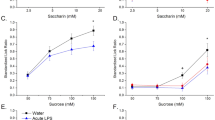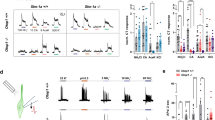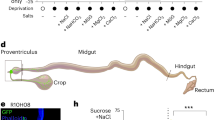Abstract
IT appears to be well established that definite changes in preference and aversion behaviour can be elicited as a result of certain physiological changes in the animal1–3; for example, the effects of salt deprivation, adrenalectomy, lack of food and insulin injections on the preference–aversion behaviour of rats for salt and sucrose solutions respectively. That taste stimulation is an important determinant of this behaviour has been demonstrated by Pfaffmann4, who found impairment in preference-aversion behaviour following bilateral removal of the chorda tyinpani and IXth nerves in rats. Richter5, Hartridge6 and Young3 have suggested that certain physiological needs result in a change in taste sensitivity for the needed substance and that the changes in taste sensitivity are peripheral in nature. However, on the basis of electrophysiological work Pfaffmann and Bare7 report “that salt deficiency does not alter the sensitivity of the taste receptors”, and Pfaffmann and Hagstrom2 conclude “that the enhanced sugar preference shown in behaviour studies following the injection of insulin is not associated with a change in taste sensitivity”. Since these conclusions are based on records of afferent nerve impulses in the chorda tympani nerve the possibility of changes of a central origin in taste sensitivity are not excluded. In fact, Pfaffmann8 has recently suggested that the behavioural changes referred to above “reflect not a change in the peripheral afferent neural message but changes in its significance for central neural processes”.
This is a preview of subscription content, access via your institution
Access options
Subscribe to this journal
Receive 51 print issues and online access
$199.00 per year
only $3.90 per issue
Buy this article
- Purchase on Springer Link
- Instant access to full article PDF
Prices may be subject to local taxes which are calculated during checkout
Similar content being viewed by others
References
Bare, J. K., J. Comp. Physiol. Psychol., 42, 242 (1949). Richter, C. P., “Harvey Lectures”, 38, 63 (1942).
Pfaffmann, C., and Hagstrom, E. C., Amer. J. Physiol., 183, 651 (1955).
Young, P. T., Comp. Psychol. Monog., 19, 1 (1949).
Pfaffmann, C., J. Comp. Physiol. Psychol., 45, 393 (1952).
Richter, C. P., Endocrinol., 24, 367 (1939).
Hartridge, H., J. Physiol., 108, 34P (1945).
Pfaffmann, C., and Bare, J. K., J. Comp. Physiol. Psychol., 43, 320 (1950).
Pfaffmann, C., Amer. J. Clin. Nutrit., 5 (2), 142 (1957).
McCance, R. A., and Widdowson, E. M., “The Chemical Composition of Foods”, 2nd edit. (H.M.S.O., London, 1946).
Author information
Authors and Affiliations
Rights and permissions
About this article
Cite this article
YENSEN, R. Influence of Salt Deficiency on Taste Sensitivity in Human Subjects. Nature 181, 1472–1474 (1958). https://doi.org/10.1038/1811472a0
Issue Date:
DOI: https://doi.org/10.1038/1811472a0
This article is cited by
-
The effect of lowering salt intake on ambulatory blood pressure to reduce cardiovascular risk in chronic kidney disease (LowSALT CKD study): protocol of a randomized trial
BMC Nephrology (2012)
-
Taste Sensitivity and Food Deprivation, Blood Sugar Level and Composition of Meal
Nature (1964)
-
Influence of Water Deprivation on Taste Sensitivity in Man
Nature (1958)
Comments
By submitting a comment you agree to abide by our Terms and Community Guidelines. If you find something abusive or that does not comply with our terms or guidelines please flag it as inappropriate.



